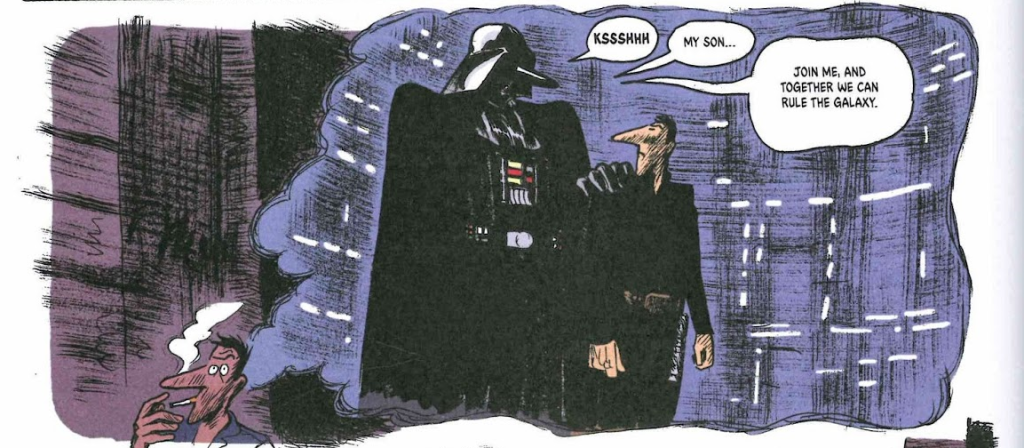
Weapons of Mass Diplomacy: A Political Comedy
Weapons of Mass Diplomacy’s original French title is Q
The artist Christophe Blain is not a new name for French comics fans after his acclaimed work on Donjon Potron Minet (in collaboration with Joann Sfar and Lewis Trondheim) and Isaac the Pirate (that he wrote and illustrated). The writer on the other hand, Abel Lanzac (nom de plume of Antonin Baudry, a French diplomat) signs his first comic book with this fictionalized account of his time as a close collaborator of Dominique de Villepin. I believe that Weapons Of Mass Diplomacy (WoMD) is a great example of a really deep collaboration between writer and artist. They were both guests at the Toronto Comic Art Festival in 2014 where they explained how interdependent their work process was -to the point of spending weeks under the same roof to work on the book. You can truly feel this connectedness as you read.
WoMD is a glimpse behind the scenes of international politics. Fans of the West Wing, come and get your fix! Everything starts when Arthur Vlamink gets a job as a speechwriter for Alexandre Taillard de Vorms, the alter ego of Dominique de Villepin. [Please, just indulge my Frenchness for a moment. To correct a common misconception: Villepin eventually became the prime minister of France, he was the French Foreign Minister at the time (2002)] Vlaminck gets thrown into a complex world and is going to have to sink or swim navigating egos, trying to understand all the tacit rules of his new environment, and learning to decrypt the seemingly ever changing expectations of his new boss. But Vlamink, if the protagonist (and proxy for Lanzac/Baudry), is not the central character. Alexandre Taillard de Vorms is the true focus of the book.
One of the most interesting aspects of the story telling is how Christophe Blain captures de Vorms’ energy. He is always in motion. Papers are flying every time he enters a room, he gets more than one set of hands at a time. Blain also makes you feel that time has a different pace inside the walls of the ministry. Everything is crisis driven, nothing ever goes as planned. Problems in the Middle East, demonstrations in Africa… the world never stops and all the characters just have to do their best to keep up with it. I sometimes felt exhausted just by reading! It is quite amazing how Blain manages to communicate this constant motion. The topic of the book is serious: the depiction of a political situation culminating in the speech de Vorms delivers at the UN Security Council to oppose the war in Iraq. But WoMD is a satirical tale, a comedy. It is truly funny and all the pain is an excuse for humor.
What is interesting in the portrayal of de Vorms is that you never know if he is a genius or a fool. He is a layered and complex character. It is as hard for the reader to pin him down as it is for his collaborators to make him sit still for a minute. Baudry has a clear admiration for de Vorms/Villepin, but at the same time the minister’s use of improbable metaphors citing classic poets and philosophers (in fairly unexpected ways) leans more often towards the ridiculous than the clever. How does he expect to enlighten his advisors with such crazy digressions? The authors made the interesting choice of not giving de Vorms the physical features of Villepin. In the book, the minister appears like a giant with square shoulders and his physical aspect changes with the situation to the 
Weapons of Mass Diplomacy is smart, well-paced and funny. And I just love it! Read it.














